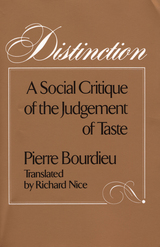
No judgment of taste is innocent. In a word, we are all snobs. Pierre Bourdieu brilliantly illuminates this situation of the middle class in the modern world. France’s leading sociologist focuses here on the French bourgeoisie, its tastes and preferences. Distinction is at once a vast ethnography of contemporary France and a dissection of the bourgeois mind.
In the course of everyday life people constantly choose between what they find aesthetically pleasing and what they consider tacky, merely trendy, or ugly. Bourdieu bases his study on surveys that took into account the multitude of social factors that play a part in a French person’s choice of clothing, furniture, leisure activities, dinner menus for guests, and many other matters of taste. What emerges from his analysis is that social snobbery is everywhere in the bourgeois world. The different aesthetic choices people make are all distinctions—that is, choices made in opposition to those made by other classes. Taste is not pure. Bourdieu finds a world of social meaning in the decision to order bouillabaisse, in our contemporary cult of thinness, in the “California sports” such as jogging and cross-country skiing. The social world, he argues, functions simultaneously as a system of power relations and as a symbolic system in which minute distinctions of taste become the basis for social judgment.
The topic of Bourdieu’s book is a fascinating one: the strategies of social pretension are always curiously engaging. But the book is more than fascinating. It is a major contribution to current debates on the theory of culture and a challenge to the major theoretical schools in contemporary sociology.

A readable analysis of postmodernity that provides a cultural context for its rise.
Though the term “postmodern” looms large on our cultural landscape, rarely do we find a systematic and impartial discussion of the circumstances of its ascendance. Identity Crises offers just such an accounting. In this book, Robert G. Dunn situates the intellectual currency of “the postmodern” within the larger context of social and cultural change shaping the movement over the past several decades. Along the way, he offers a necessary corrective to both the sociological and historical shortcomings of cultural criticism and the cultural myopia of social science in considering the postmodern world.
Dunn explains contemporary culture and contemporary cultural criticism as part of a distinct historical moment, one that entails new social relations as a consequence of new means of production. In place of prevailing cultural and political constructions, Dunn proposes a “social relational” approach that explicitly recognizes the structural and situational contexts of identity formation. He conceptualizes issues of identity and difference in terms of social, cultural, and political transformations in the transition from modern to postmodern society. This provides a socio-historical perspective through which to consider the impact of consumption, mass media, globalization, and new social movements on identity-forming processes. Unique to this undertaking and crucial to Dunn’s critique of poststructuralist and postmodern theories is his application of the theory of George Herbert Mead as a more effective means of theorizing identity and difference. Dunn’s focus on postmodernity as opposed to postmodernism serves to ground the analysis of identity and difference materially and socially. Learned, evenhanded, and enlightening, Identity Crises is an essential demonstration of the connections between cultural theory and criticism, contemporary culture, and sociological analysis. ISBN 0-8166-3072-0 Cloth $49.95xxISBN 0-8166-3073-9 Paper $19.95x304 pages 5 7/8 x 9 MarchTranslation inquiries: University of Minnesota PressREADERS
Browse our collection.
PUBLISHERS
See BiblioVault's publisher services.
STUDENT SERVICES
Files for college accessibility offices.
UChicago Accessibility Resources
home | accessibility | search | about | contact us
BiblioVault ® 2001 - 2024
The University of Chicago Press









